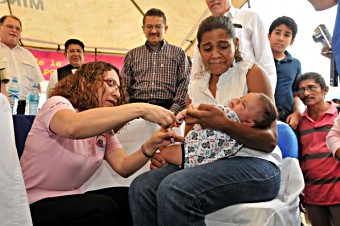
Minister of Health Dr. Sonia Castro Gonzalez vaccinates 10-week-old Caleb Alexander Martinez against pneumococcal disease as he is held by his mother Rosa Elia Obando.
Credit: GAVI/2010/German Miranda.
Managua, Nicaragua, 12 December 2010 - A new vaccine which prevents the most deadly forms of pneumonia - the world's number one killer of children - was introduced today in the routine immunisation programme of a developing country, paving the way to introductions in more than 40 developing countries.
International leaders in global health joined the Nicaraguan government and hundreds of parents and children to celebrate the rollout of the new pneumococcal conjugate vaccine in the developing world less than a year after it was introduced in rich countries.
Global roll out
The event marks the beginning of a global routine immunisation programme against pneumococcal disease in the world's poorest countries, supported by the Global Alliance for Vaccines and Immunisation (GAVI).
The roll out begins in Central America this year before starting in Africa and the Middle East early in 2011.
Pneumococcal disease
Pneumococcal disease, which causes pneumonia, meningitis and sepsis, kills more than half a million children under five years every year.
"For every one child who dies of pneumonia, the most common form of serious pneumococcal disease in rich countries, 2,000 die from pneumonia in developing countries. This is not acceptable," said Helen Evans, interim CEO of GAVI Alliance.
"The members of the GAVI Alliance are committed to bringing life-saving vaccines to the children who need them the most. This event is the first step in an ambitious plan to introduce this powerful new pneumococcal vaccine in the world's poorest countries," Helen Evans added. "GAVI's efforts in the next five years will significantly focus on tackling the two biggest childhood killers, pneumonia and diarrhoeal diseases," Mrs Evans said, highlighting that GAVI needs an additional US$ 3.7 billion over the next five years to accelerate the introduction of new and underused vaccines in the developing world.
Nicaragua
From today, Nicaraguan children will receive pneumococcal vaccines on a routine basis as part of a regular childhood immunisation package provided by the country's Ministry of Health. To support the introduction of pneumococcal vaccine in Nicaragua, GAVI has already approved US$4,732,000 for 2010-2011, and expects to commit another US$10 million through to 2015.
Nicaragua is showing its leadership in the fight against pneumococcal disease. By co-financing the vaccine, the Ministry of Health, and the whole country, is making a commitment to immunisation and child survival.
By rapidly scaling up the roll out of the pneumococcal vaccine to more than 40 countries, the GAVI Alliance and its partners, including PAHO, WHO and UNICEF, can avert approximately 700,000 deaths by 2015 and up to seven million deaths by 2030(1).
MDG 4
The wide introduction of pneumococcal vaccine is critical to reaching the Millennium Development Goals, especially MDG 4, aiming at reducing childhood mortality.
Italy, the United Kingdom, Canada, the Russian Federation, Norway, and the Bill & Melinda Gates Foundation who together contributed US$ 1.5 billion through an innovative financing mechanism called the Advance Market Commitment, have helped make the rollout of these new-generation pneumococcal vaccines possible within a year of their introduction in rich countries, at a fraction of the price charged in rich countries.
(1). Based on the latest Strategic Demand Forecast v2.0
